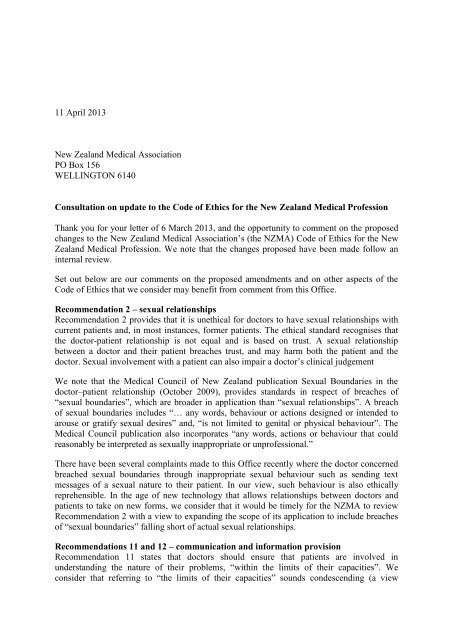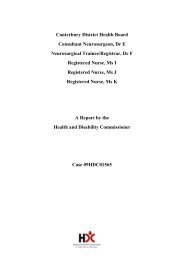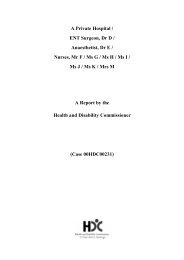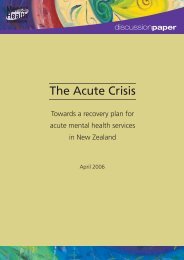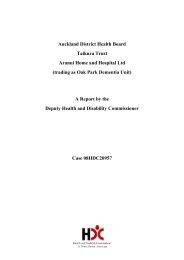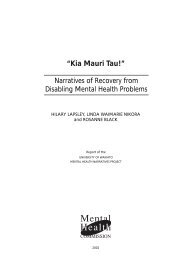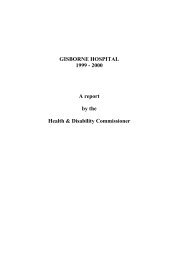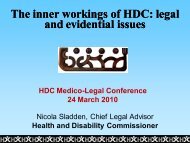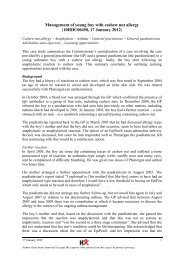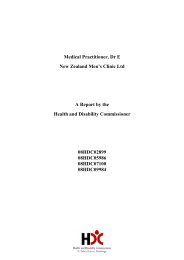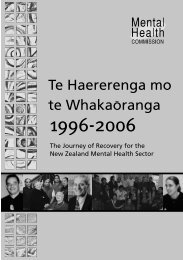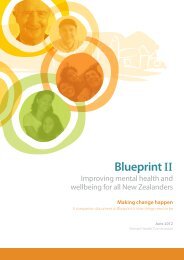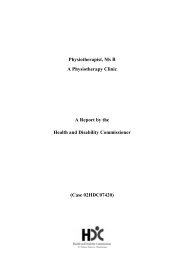Code of Ethics for the New Zealand Medical Profession - Health and ...
Code of Ethics for the New Zealand Medical Profession - Health and ...
Code of Ethics for the New Zealand Medical Profession - Health and ...
Create successful ePaper yourself
Turn your PDF publications into a flip-book with our unique Google optimized e-Paper software.
11 April 2013<br />
<strong>New</strong> <strong>Zeal<strong>and</strong></strong> <strong>Medical</strong> Association<br />
PO Box 156<br />
WELLINGTON 6140<br />
Consultation on update to <strong>the</strong> <strong>Code</strong> <strong>of</strong> <strong>Ethics</strong> <strong>for</strong> <strong>the</strong> <strong>New</strong> <strong>Zeal<strong>and</strong></strong> <strong>Medical</strong> Pr<strong>of</strong>ession<br />
Thank you <strong>for</strong> your letter <strong>of</strong> 6 March 2013, <strong>and</strong> <strong>the</strong> opportunity to comment on <strong>the</strong> proposed<br />
changes to <strong>the</strong> <strong>New</strong> <strong>Zeal<strong>and</strong></strong> <strong>Medical</strong> Association’s (<strong>the</strong> NZMA) <strong>Code</strong> <strong>of</strong> <strong>Ethics</strong> <strong>for</strong> <strong>the</strong> <strong>New</strong><br />
<strong>Zeal<strong>and</strong></strong> <strong>Medical</strong> Pr<strong>of</strong>ession. We note that <strong>the</strong> changes proposed have been made follow an<br />
internal review.<br />
Set out below are our comments on <strong>the</strong> proposed amendments <strong>and</strong> on o<strong>the</strong>r aspects <strong>of</strong> <strong>the</strong><br />
<strong>Code</strong> <strong>of</strong> <strong>Ethics</strong> that we consider may benefit from comment from this Office.<br />
Recommendation 2 – sexual relationships<br />
Recommendation 2 provides that it is unethical <strong>for</strong> doctors to have sexual relationships with<br />
current patients <strong>and</strong>, in most instances, <strong>for</strong>mer patients. The ethical st<strong>and</strong>ard recognises that<br />
<strong>the</strong> doctor-patient relationship is not equal <strong>and</strong> is based on trust. A sexual relationship<br />
between a doctor <strong>and</strong> <strong>the</strong>ir patient breaches trust, <strong>and</strong> may harm both <strong>the</strong> patient <strong>and</strong> <strong>the</strong><br />
doctor. Sexual involvement with a patient can also impair a doctor’s clinical judgement<br />
We note that <strong>the</strong> <strong>Medical</strong> Council <strong>of</strong> <strong>New</strong> <strong>Zeal<strong>and</strong></strong> publication Sexual Boundaries in <strong>the</strong><br />
doctor–patient relationship (October 2009), provides st<strong>and</strong>ards in respect <strong>of</strong> breaches <strong>of</strong><br />
“sexual boundaries”, which are broader in application than “sexual relationships”. A breach<br />
<strong>of</strong> sexual boundaries includes “… any words, behaviour or actions designed or intended to<br />
arouse or gratify sexual desires” <strong>and</strong>, “is not limited to genital or physical behaviour”. The<br />
<strong>Medical</strong> Council publication also incorporates “any words, actions or behaviour that could<br />
reasonably be interpreted as sexually inappropriate or unpr<strong>of</strong>essional.”<br />
There have been several complaints made to this Office recently where <strong>the</strong> doctor concerned<br />
breached sexual boundaries through inappropriate sexual behaviour such as sending text<br />
messages <strong>of</strong> a sexual nature to <strong>the</strong>ir patient. In our view, such behaviour is also ethically<br />
reprehensible. In <strong>the</strong> age <strong>of</strong> new technology that allows relationships between doctors <strong>and</strong><br />
patients to take on new <strong>for</strong>ms, we consider that it would be timely <strong>for</strong> <strong>the</strong> NZMA to review<br />
Recommendation 2 with a view to exp<strong>and</strong>ing <strong>the</strong> scope <strong>of</strong> its application to include breaches<br />
<strong>of</strong> “sexual boundaries” falling short <strong>of</strong> actual sexual relationships.<br />
Recommendations 11 <strong>and</strong> 12 – communication <strong>and</strong> in<strong>for</strong>mation provision<br />
Recommendation 11 states that doctors should ensure that patients are involved in<br />
underst<strong>and</strong>ing <strong>the</strong> nature <strong>of</strong> <strong>the</strong>ir problems, “within <strong>the</strong> limits <strong>of</strong> <strong>the</strong>ir capacities”. We<br />
consider that referring to “<strong>the</strong> limits <strong>of</strong> <strong>the</strong>ir capacities” sounds condescending (a view
already expressed in <strong>the</strong> 15 November 2007 submission made by this Office on <strong>the</strong> <strong>the</strong>n<br />
review <strong>of</strong> <strong>the</strong> NZMA <strong>Code</strong> <strong>of</strong> <strong>Ethics</strong>). We recommend that <strong>the</strong> proviso to this<br />
recommendation be amended, so that <strong>the</strong> recommendation is that doctors should ensure, as<br />
far as possible, that patients are involved in underst<strong>and</strong>ing <strong>the</strong> nature <strong>of</strong> <strong>the</strong>ir problems. If a<br />
patient has limited capacity, a doctor should take steps to provide in<strong>for</strong>mation in a <strong>for</strong>m,<br />
language <strong>and</strong> manner appropriate to <strong>the</strong> patient to assist <strong>the</strong> patient to underst<strong>and</strong>.<br />
Recommendation 12 states that doctors should, “within reason, provide adequate in<strong>for</strong>mation<br />
to <strong>the</strong>ir patients about <strong>the</strong>ir assessment <strong>and</strong> available treatments”. This recommendation falls<br />
short <strong>of</strong> <strong>the</strong> legal st<strong>and</strong>ard under <strong>the</strong> <strong>Code</strong> <strong>of</strong> <strong>Health</strong> <strong>and</strong> Disability Services Consumers’<br />
Rights 1996 (<strong>the</strong> <strong>Code</strong>) to ensure that consumers are fully in<strong>for</strong>med. We consider that, to<br />
avoid confusion, <strong>the</strong> ethical st<strong>and</strong>ard in relation to in<strong>for</strong>mation provision should equate with<br />
<strong>the</strong> legal st<strong>and</strong>ard. Accordingly, we recommend that <strong>the</strong> NZMA remove <strong>the</strong> words “within<br />
reason” from Recommendation 12. We also recommend that <strong>the</strong> ambit <strong>of</strong> <strong>the</strong> obligation be<br />
extended beyond only <strong>the</strong> provision <strong>of</strong> in<strong>for</strong>mation about <strong>the</strong> doctor’s assessment <strong>and</strong><br />
treatment options to include all in<strong>for</strong>mation that <strong>the</strong> consumer needs to make an in<strong>for</strong>med<br />
choice <strong>and</strong> give in<strong>for</strong>med consent, as per Right 6 <strong>of</strong> <strong>the</strong> <strong>Code</strong>.<br />
Recommendation 22 – assistance with benefits<br />
It would be helpful if this recommendation is extended to specify that doctors have a<br />
responsibility to assist patients in making ACC claims or applying <strong>for</strong> benefits by providing<br />
required in<strong>for</strong>mation in a timely manner, <strong>and</strong> assisting in <strong>the</strong> completion <strong>of</strong> <strong>the</strong> <strong>for</strong>ms.<br />
Recommendation 23 – remote consultation<br />
This newly proposed recommendation provides that, when undertaking remote consultation, a<br />
doctor should always exercise <strong>the</strong>ir judgement as to whe<strong>the</strong>r diagnosis <strong>and</strong> treatment by this<br />
means is appropriate. We support <strong>the</strong> inclusion <strong>of</strong> this new recommendation. In a recent case,<br />
<strong>the</strong> Commissioner found a doctor in breach <strong>of</strong> Right 4(1) <strong>of</strong> <strong>the</strong> <strong>Code</strong> <strong>for</strong> prescribing codeine<br />
to his patient over <strong>the</strong> telephone, without first establishing that <strong>the</strong> patient had a known<br />
allergy to codeine, <strong>and</strong> <strong>for</strong> prescribing antibiotics to <strong>the</strong> same patient over <strong>the</strong> telephone<br />
without first undertaking a clinical review <strong>of</strong> <strong>the</strong> patient. The doctor’s management <strong>of</strong> his<br />
patient in that case illustrates <strong>the</strong> potential risk <strong>of</strong> managing a patient without access to<br />
relevant clinical data.<br />
Recommendation 26 – consent<br />
Recommendation 26 provides, “When patients are not capable <strong>of</strong> making an in<strong>for</strong>med choice<br />
or giving in<strong>for</strong>med consent, doctors should consider any previously expressed preferences<br />
from <strong>the</strong> patient, <strong>the</strong> wishes <strong>of</strong> <strong>the</strong> family, guardian or o<strong>the</strong>r appropriate person, <strong>and</strong> consult<br />
with colleagues be<strong>for</strong>e making management decisions …”<br />
Right 7(4) <strong>of</strong> <strong>the</strong> <strong>Code</strong> sets out <strong>the</strong> legal position in respect <strong>of</strong> providing services to<br />
consumers who are not <strong>the</strong>mselves competent to consent to those services. When consumers<br />
are not competent to make an in<strong>for</strong>med choice or give in<strong>for</strong>med consent, a doctor should first<br />
establish whe<strong>the</strong>r <strong>the</strong> consumer has a valid advance directive that provides consent to <strong>the</strong><br />
services proposed. If <strong>the</strong>re is no valid advance directive, a doctor should establish whe<strong>the</strong>r<br />
<strong>the</strong>re is anyone available who is legally entitled to consent to services on that consumer’s<br />
behalf. The class <strong>of</strong> people legally entitled to consent to services on a consumer's behalf<br />
include welfare guardians, enduring powers <strong>of</strong> attorney <strong>for</strong> personal care <strong>and</strong> welfare, <strong>and</strong> <strong>the</strong><br />
guardians <strong>of</strong> children. Family members do not automatically have a right to consent to<br />
services on <strong>the</strong> behalf <strong>of</strong> ano<strong>the</strong>r family member unless <strong>the</strong>y also fall into one <strong>of</strong> <strong>the</strong> classes<br />
<strong>of</strong> people legally entitled to consent, as set out above.
Where no valid advance directive applies, <strong>and</strong> no one who is legally entitled to consent on <strong>the</strong><br />
consumer's behalf is available, services may only be provided to a consumer who is not<br />
<strong>the</strong>mselves competent to consent where <strong>the</strong> proposed services are in <strong>the</strong> best interests <strong>of</strong> <strong>the</strong><br />
consumer, <strong>and</strong> where <strong>the</strong> o<strong>the</strong>r provisions <strong>of</strong> Right 7(4) <strong>of</strong> <strong>the</strong> <strong>Code</strong> are met.<br />
To ensure consistency between <strong>the</strong> ethical <strong>and</strong> legal st<strong>and</strong>ards, <strong>and</strong> to avoid confusion<br />
amongst <strong>the</strong> pr<strong>of</strong>ession, we suggest that Recommendation 26 be amended to provide as<br />
follows: “When patients are not capable <strong>of</strong> making an in<strong>for</strong>med choice or giving in<strong>for</strong>med<br />
consent, <strong>and</strong> no valid advance directive applies, doctors can obtain consent to services from a<br />
person who is legally entitled to consent on that patient’s behalf. If a person legally entitled to<br />
consent on <strong>the</strong> patient’s behalf is not available, doctors should only provide <strong>the</strong> services if <strong>the</strong><br />
services are in <strong>the</strong> best interests <strong>of</strong> <strong>the</strong> patient, <strong>and</strong> should consider any previously expressed<br />
preferences from <strong>the</strong> patient …”<br />
Recommendation 41 – declaring interests<br />
As currently worded, this recommendation is ambiguous about to whom <strong>the</strong> declaration <strong>of</strong><br />
interest should be made. We suggest that <strong>the</strong> recommendation is amended to clarify that<br />
doctors should declare financial or o<strong>the</strong>r interests in commercial organisations or products to<br />
any potentially affected patients.<br />
Recommendation 46 – social media<br />
This newly proposed recommendation provides that doctors should exercise caution when<br />
using social media in a pr<strong>of</strong>essional or private capacity. We consider it appropriate to update<br />
<strong>the</strong> <strong>Code</strong> <strong>of</strong> <strong>Ethics</strong> to include a recommendation regarding social media, <strong>and</strong> note that <strong>the</strong><br />
<strong>Medical</strong> Council <strong>of</strong> <strong>New</strong> <strong>Zeal<strong>and</strong></strong> is also looking at <strong>the</strong>se issues. We note that<br />
Recommendation 46 does not refer directly to doctors accessing patients’ social media but<br />
suggest this is something you may wish to include.<br />
The Commissioner recently advised <strong>the</strong> <strong>Medical</strong> Council that, while he considers that<br />
accessing a patient’s social media in a pr<strong>of</strong>essional capacity may be acceptable in certain<br />
limited circumstances, it should only be accessed once patient consent has been obtained. The<br />
Commissioner does not consider it ethically or pr<strong>of</strong>essionally appropriate (except in<br />
emergency situations) <strong>for</strong> a doctor to access a patient’s social media <strong>for</strong> pr<strong>of</strong>essional purposes<br />
without that patient’s consent. We <strong>the</strong>re<strong>for</strong>e suggest that <strong>the</strong> newly proposed recommendation<br />
be amended to include <strong>the</strong> requirement <strong>for</strong> consent when accessing a patient’s social media.<br />
The doctor-patient relationship is underpinned by <strong>the</strong> principles <strong>of</strong> transparency,<br />
confidentiality <strong>and</strong> trust. Social media does not change those principles; ra<strong>the</strong>r, it raises new<br />
questions about what is ethical <strong>and</strong> pr<strong>of</strong>essional conduct in an era where digital connectivity<br />
is pushing <strong>the</strong> traditional parameters <strong>of</strong> pr<strong>of</strong>essional boundaries <strong>and</strong> patient confidentiality. 1<br />
Obtaining patient consent to access such in<strong>for</strong>mation may prevent harm to <strong>the</strong> <strong>the</strong>rapeutic<br />
relationship from accessing such in<strong>for</strong>mation, regardless <strong>of</strong> <strong>the</strong> in<strong>for</strong>mation being published<br />
in a public <strong>for</strong>um.<br />
1 For example, <strong>the</strong> majority <strong>of</strong> guidelines <strong>and</strong> st<strong>and</strong>ards published by overseas regulatory authorities <strong>and</strong><br />
medical colleges discuss <strong>the</strong> use <strong>of</strong> social media in <strong>the</strong> context <strong>of</strong> maintaining pr<strong>of</strong>essional boundaries (eg<br />
accepting a Facebook “Friend Request” from a patient) <strong>and</strong> patient confidentiality (eg publishing health<br />
in<strong>for</strong>mation about a patient on Facebook or an internet blog) see: British <strong>Medical</strong> Association Using social<br />
media: practical <strong>and</strong> ethical guidance <strong>for</strong> doctors <strong>and</strong> medical students; College <strong>of</strong> Physicians <strong>and</strong> Surgeons <strong>of</strong><br />
British Columbia Pr<strong>of</strong>essional St<strong>and</strong>ards <strong>and</strong> Guidelines: Social Media <strong>and</strong> Online Networking Forums<br />
(September 2010); General <strong>Medical</strong> Council Confidentiality (October 2009).
In considering whe<strong>the</strong>r to access a patient’s social media <strong>and</strong> to obtain consent <strong>for</strong> that<br />
purpose, a doctor ought to consider <strong>the</strong> risks <strong>and</strong> benefits <strong>of</strong> such steps. This involves<br />
balancing <strong>the</strong> risk that <strong>the</strong> <strong>the</strong>rapeutic relationship could be harmed by seeking that consent<br />
against <strong>the</strong> potential benefit <strong>the</strong> social media in<strong>for</strong>mation may have on <strong>the</strong> doctor’s ability to<br />
care <strong>for</strong> <strong>and</strong> treat that patient (bearing in mind that in diagnosing <strong>and</strong> treating a patient, a<br />
doctor must rely on objective <strong>and</strong> accurate clinical in<strong>for</strong>mation, <strong>and</strong> <strong>the</strong> potential unreliability<br />
<strong>of</strong> social media in<strong>for</strong>mation). 2<br />
It is difficult to envision <strong>the</strong> types <strong>of</strong> situations where it would be helpful <strong>for</strong> a doctor to<br />
access a patient’s social media <strong>for</strong> pr<strong>of</strong>essional purposes. However, in <strong>the</strong> very limited<br />
circumstances in which a doctor considers it appropriate to do so, <strong>the</strong> doctor should engage<br />
<strong>the</strong> patient in a clear <strong>and</strong> transparent conversation about why access to <strong>the</strong>ir social media<br />
in<strong>for</strong>mation is necessary, <strong>and</strong> obtain <strong>the</strong> patient’s consent. In many cases, such a conversation<br />
may obviate <strong>the</strong> need <strong>for</strong> <strong>the</strong> doctor to access <strong>the</strong> patient’s social media as it may well lead to<br />
<strong>the</strong> patient providing that in<strong>for</strong>mation <strong>the</strong>mselves.<br />
Recommendation 60 – teaching <strong>and</strong> consent<br />
Recommendation 60 provides that if teaching involves a patient in a permanent vegetative<br />
state, <strong>the</strong> teacher should, if at all possible, consult with a nursing or medical colleague <strong>and</strong> a<br />
relative be<strong>for</strong>e “commencing <strong>the</strong> session”.<br />
We refer you to <strong>the</strong> comment above regarding Recommendation 26, <strong>and</strong> <strong>the</strong> legal position<br />
with respect to obtaining consent be<strong>for</strong>e services are provided to a consumer who is<br />
<strong>the</strong>mselves not competent to consent. In addition, Right 9 <strong>of</strong> <strong>the</strong> <strong>Code</strong> provides that <strong>the</strong> rights<br />
in <strong>the</strong> <strong>Code</strong> extend to those occasions when a consumer is participating in, or it is proposed<br />
that a consumer participate in, teaching. Accordingly, if it is proposed that teaching involve a<br />
person in a permanent vegetative state (or in any o<strong>the</strong>r state where <strong>the</strong> consumer is not<br />
competent to consent), consent to that teaching should be sought from <strong>the</strong> consumer’s legal<br />
guardian <strong>and</strong>, if no such guardian is available, <strong>the</strong> consumer should not be involved in<br />
teaching unless <strong>the</strong> criteria in Right 7(4) <strong>of</strong> <strong>the</strong> <strong>Code</strong> are met.<br />
We also note that both recommendations 60 <strong>and</strong> 61 provide that consent to teaching should<br />
be obtained, <strong>and</strong> sufficient in<strong>for</strong>mation on <strong>the</strong> <strong>for</strong>m <strong>and</strong> content <strong>of</strong> <strong>the</strong> teaching provided,<br />
“wherever possible”. Right 6(1)(d) <strong>of</strong> <strong>the</strong> <strong>Code</strong> provides that patients have a right to be<br />
in<strong>for</strong>med <strong>of</strong> any proposed participation in teaching or research. From a legal perspective,<br />
<strong>the</strong>re is no “wherever possible” qualification to that requirement. Accordingly, we<br />
recommend that recommendations 60 <strong>and</strong> 61 be streng<strong>the</strong>ned because <strong>the</strong> recommendation<br />
that consent be obtained “whenever possible” is insufficient from an ethical <strong>and</strong> a legal<br />
viewpoint (as indicated in <strong>the</strong> earlier submissions <strong>of</strong> this Office dated 15 November 2007).<br />
There are very limited circumstances where teaching involving direct patient contact should<br />
take place without <strong>the</strong> consent <strong>of</strong> <strong>the</strong> patient (or legal guardian).<br />
2 Individuals use social media sites <strong>for</strong> various purposes; <strong>the</strong> in<strong>for</strong>mation contained on those sites has been<br />
selected by <strong>the</strong> individual; <strong>and</strong> <strong>the</strong> ability to verify <strong>the</strong> accuracy <strong>of</strong> <strong>the</strong> in<strong>for</strong>mation is limited.


